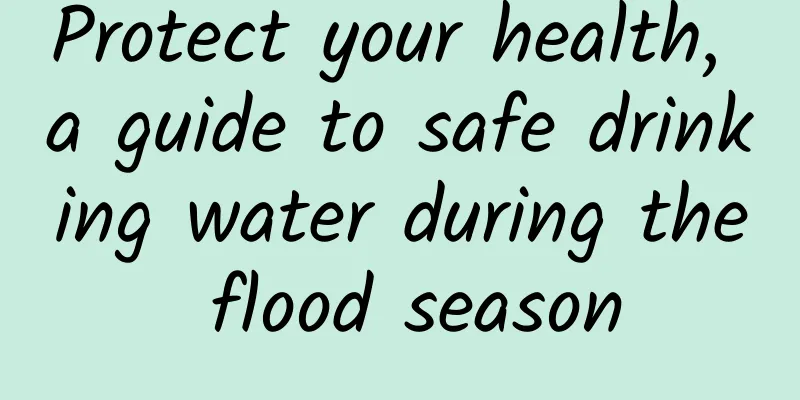Protect your health, a guide to safe drinking water during the flood season

|
Author: Chen Jiameng: The Sixth People's Hospital Affiliated to Shanghai Jiao Tong University School of Medicine Reviewer: Zhang Weitian, Chief Physician, Shanghai Sixth People's Hospital, School of Medicine, Shanghai Jiao Tong University Water is the root of all things. It is the main component of body fluids and can maintain normal metabolism of the body. Due to the raging floods during the flood season, the clean water sources that were originally drinkable have been seriously polluted. Water pollution is one of the main risk factors for gastrointestinal infectious diseases during the flood season and is also the top priority in epidemic prevention tasks. If you drink unsterilized and untested unknown water sources, it is very easy to cause an outbreak of gastrointestinal infectious diseases, which are often manifested as abdominal pain, diarrhea, vomiting, high fever, bloody stools, and even collapse in severe cases. Therefore, mastering scientific drinking water knowledge and ensuring drinking water safety during the flood season are of great significance for preventing gastrointestinal infectious diseases and protecting your own health. This article aims to deeply analyze the potential hazards of drinking water during the flood season and put forward a series of practical drinking water precautions, in order to provide scientific and effective drinking water safety guidance for the general public during the flood season. Figure 1 Copyright image, no permission to reprint 1. What are the hazards to drinking water during the flood season? 1. Heavy rains may damage water plant facilities, resulting in a decline in water quality. Water purification equipment and water storage equipment may also be damaged. 2. Water quality deteriorates, manifested as visible turbidity, the presence of large amounts of muddy and sandy objects, and a peculiar smell. Severe pollution may cause diarrhea-related pathogens to appear in the water, greatly limiting and affecting people's drinking water needs. 3. Floods will wash away the surface of the earth, not only flooding toilets and other sanitary facilities, but also causing various garbage, animal carcasses and other pollutants to be washed into rivers and reservoirs. Due to the hot weather and high humidity, various pathogenic microorganisms are easily bred. When consumed by humans or other animals, they can cause large-scale intestinal diseases and other infectious epidemics, seriously threatening public health and safety. 4. Urban waterlogging: Floods hit buildings wantonly, and warehouses and factories storing potentially hazardous chemicals may also be affected. Once these places are flooded, toxic and harmful chemicals may leak. These chemicals quietly penetrate into the water source with the flow of water, and the hidden dangers they pose to drinking water cannot be underestimated. Figure 2 Copyright image, no permission to reprint 2. What precautions should be taken when drinking water during the flood season? Figure 3 Copyright image, no permission to reprint 1. Do not drink raw water. Drinking water must be boiled thoroughly or filtered with a water purifier. Bottled water or barreled water that has been soaked in flood water is not recommended for direct use and must also be boiled. 2. When individuals take water from natural water sources, they must first disinfect it under the guidance of professionals before drinking it. It is strictly forbidden to distribute disinfectants to individuals for treatment without authorization to avoid adverse consequences. 3. Wash your hands frequently and regularly disinfect daily water containers such as jars, buckets, and basins to ensure that items that come into direct contact with drinking water are clean and hygienic, and maintain drinking water safety from the details. 4. Do not use water from unknown sources to wash food and tableware, and it is strictly forbidden to use it for daily activities such as gargling, washing vegetables, etc. 5. Protect the water source environment, strengthen surrounding protection, and clean up surrounding garbage. Dispose of domestic garbage at designated locations to avoid secondary pollution. Rationally discharge domestic sewage and feces, clean key places, and jointly maintain the tranquility of the water source. 6. Through creative posters, practical promotional materials and other forms, we will go deep into the community to popularize scientific knowledge on drinking water and methods to prevent gastrointestinal infectious diseases, such as washing hands frequently, eating cooked food, and insisting on drinking boiled water, so that scientific drinking water will become everyone's conscious behavior in daily life. 7. Disinfection, pest control and environmental improvement after the water has receded are also crucial to ensure the safety of drinking water and food. Wells and reservoirs need to be cleaned and flushed, and disinfected with chlorine-containing disinfectants by professionals. Secondary water supply tanks in high-rise residential buildings also need to be cleaned in time to prevent mud and sand from entering. In short, drinking water safety during the flood season is related to everyone's health. I hope that after reading this article, everyone can enhance their awareness of drinking water safety during the flood season and make scientific drinking a daily habit. Let us work together, starting with ourselves, to protect this drop of life-giving water and ensure that we are safe and healthy during the flood season. |
<<: All about Varicocele Surgery
>>: The baby became ugly because of enlarged adenoids!
Recommend
The belly is growing fat but the chest is not growing
For girls, if only the belly grows fat but the ch...
Is body odor hereditary in some women?
Generally speaking, as patients with body odor, t...
Eyes will swell after pupil liner surgery
The pupil line is drawn along the natural directi...
Can Kunling Pills promote ovulation?
Kunling Pills sometimes do have many miraculous e...
What causes lower abdominal pain and yellow vaginal discharge due to vaginitis?
There are many gynecological diseases that are co...
Why is the center of a cake soggy when baked in the oven? How are coffee beans roasted?
The method or principle of low-temperature baking...
How many days does discharge last after hysterectomy?
After a hysterectomy, women need to pay attention...
Can I drink ginger juice and brown sugar water during menstruation?
Brown sugar water is a must-have for most female ...
How to do vaginal relaxation exercises
Vaginal loosening is a problem that every woman w...
What does cervical squamous hyperplasia mean?
Nowadays, many women have improved their awarenes...
Temperature changes during ovulation
Careful women may find that the body temperature ...
There is a lump in the breast that hurts when pressed
Many people today, often due to work pressure, an...
Does 4 fetal movements in 5 minutes count as one?
After 16 weeks of pregnancy, pregnant women can b...
What are some ways for women to take estrogen?
In order to make your body healthier, stay young ...
How to take care of women during menstruation
Every woman will have different reactions when sh...









